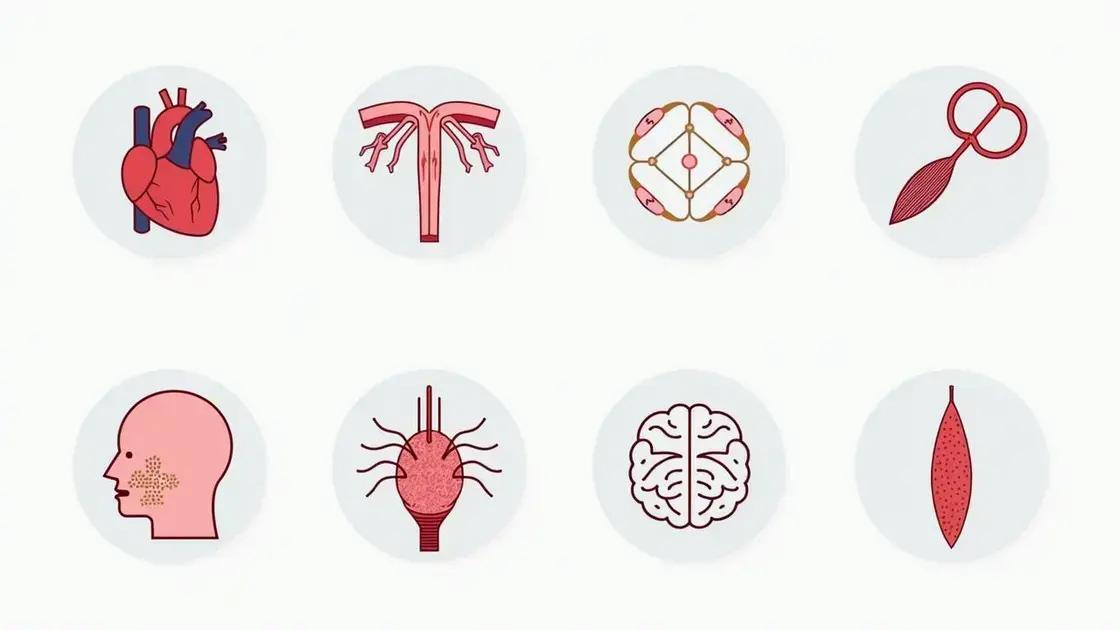Erectile dysfunction (ED) can occur in men with no prior health issues due to various factors, including psychological stress, lifestyle choices like diet and exercise, and hormonal imbalances. It is essential to recognize symptoms and seek medical advice if ED becomes frequent, as effective treatments are available to improve sexual health and overall well-being.
Erectile dysfunction is often considered a condition linked to underlying health issues. However, does erectile dysfunction occur in men with no prior health issues? This article delves into this important question, revealing insights into how erectile dysfunction can affect men regardless of their health history. We will explore various factors that contribute to ED, including lifestyle and psychological influences, and discuss when it is advisable to seek medical assistance. Stay tuned as we uncover the truth about this sensitive topic.
Understanding Erectile Dysfunction

Erectile dysfunction (ED), also known as impotence, is a condition affecting a man’s ability to achieve or maintain an erection during sexual activity. This condition can happen at any age, but it is more common in older men. Many people believe that erectile dysfunction is only linked to physical health issues, but this is not entirely true. Even men with no previous health problems can experience ED.
Understanding How ED Develops
Several factors can contribute to the development of erectile dysfunction. These factors are not limited to physical health; psychological and emotional aspects also play a crucial role. Men’s bodies and minds work together during the sexual arousal process, so issues in either area can lead to difficulties.
Physical Factors
While many assume physical conditions like diabetes or heart disease are the main culprits, any changes in blood flow can affect erections. Sometimes, a man’s hormonal balance or nerve function can be disrupted due to various reasons, even without existing health conditions.
Psychological Factors
Emotional and psychological health is significantly tied to sexual performance. Feelings of anxiety, stress, or depression can lead to ED, making it vital for men to assess their mental well-being. Social or performance pressures can also lead to temporary erectile dysfunction.
Age and Erectile Dysfunction
As men age, the likelihood of experiencing erectile dysfunction increases. This may be due to changes in hormone levels, blood flow, and muscle tone. Understanding that aging is a natural process can help men approach the issue without fear or anxiety.
Seeking Help
If a man experiences erectile dysfunction more than occasionally, it is essential to talk to a healthcare professional. Addressing both physical and psychological aspects early can lead to effective treatment and improved sexual health.
Common Causes of ED

Erectile Dysfunction (ED) can stem from a variety of causes, many of which may not be tied to any previous health issues. Recognizing these causes can help in addressing the problem effectively.
1. Vascular Issues
Heart disease and atherosclerosis can affect blood flow, which is essential for achieving an erection. Conditions affecting the blood vessels might limit the blood flow needed for erections, even if they have not been diagnosed earlier.
2. Hormonal Imbalances
Hormones like testosterone play a significant role in male sexual health. Low testosterone levels, which may occur for various reasons, can lead to erectile dysfunction. Even without prior health conditions, changes in hormone levels can significantly affect sexual performance.
3. Nerve Damage
Conditions that cause nerve damage can impact sexual function. Injuries or conditions affecting the pelvic area could also lead to ED. This nerve disruption may happen for various reasons, causing issues even in men who appeared healthy before.
4. Psychological Factors
Emotional well-being is just as important as physical health when it comes to erectile function. Stress, anxiety, and depression may develop at any time and lead to temporary or chronic erectile issues, regardless of a man’s health history.
5. Lifestyle Choices
Choices like smoking, heavy drinking, and lack of physical activity can contribute to erectile dysfunction. These habits can affect blood circulation and overall health, leading to problems with erections even in men who did not previously have any health issues.
Impact of Psychological Factors

Psychological factors significantly influence erectile dysfunction (ED) and can affect men with no prior health issues. Understanding these factors is essential to addressing ED effectively.
1. Stress
Everyday stress from work, relationships, or finances can weigh heavily on a man’s mind. This stress can make it difficult to relax and enjoy intimate moments, leading to difficulties in achieving or maintaining an erection.
2. Anxiety
Performance anxiety is common among men. Fear of not satisfying a partner or concern about one’s sexual health can cause increased pressure that hinders sexual performance. This anxiety can create a cycle, as men become anxious about their ability to perform, which can further perpetuate the issue.
3. Depression
Depression can lead to decreased libido and interest in sexual activity. Many men with depression experience ED as a result of their mental state. Addressing the underlying depression is crucial for improving sexual health.
4. Relationship Issues
Strains in a relationship can also contribute to erectile dysfunction. Lack of communication, trust issues, or emotional disconnect can make intimacy challenging. Understanding and resolving these issues can help improve sexual performance.
5. Other Psychological Factors
Low self-esteem, past trauma, or negative sexual experiences can also affect a man’s confidence. These factors can lead to a fear of intimacy or a reluctance to seek help for erectile dysfunction, making open discussion critical.
Lifestyle Choices and Their Influence

Lifestyle choices play a significant role in sexual health and can greatly influence erectile dysfunction (ED). Understanding these choices is crucial, especially for men with no prior health issues.
1. Diet
A balanced diet is important for overall health, including sexual health. Diets high in fats, sugars, and processed foods can negatively impact blood flow and hormone levels. On the other hand, foods rich in fruits, vegetables, whole grains, and lean proteins can support better sexual function.
2. Exercise
Regular physical activity boosts blood circulation and can help maintain a healthy weight. Aerobic exercise, in particular, strengthens the heart and improves overall endurance, which is vital for sexual performance. Even moderate exercise can significantly lower the risk of ED.
3. Smoking
Smoking is detrimental to vascular health and can restrict blood flow to the penis, leading to erectile difficulties. Quitting smoking can improve overall health and may reverse erectile dysfunction in some men.
4. Alcohol Consumption
Excessive alcohol intake can affect the nervous system and lead to impaired sexual function. While moderate drinking may not have a significant negative effect, heavy drinking can exacerbate issues with achieving or maintaining erections.
5. Sleep
Quality sleep is crucial for maintaining healthy testosterone levels and reducing stress. Poor sleep habits can lead to hormonal imbalances, which can contribute to ED. Establishing a regular sleep pattern is important for men’s overall health.
When to Seek Medical Advice

Seeking medical advice regarding erectile dysfunction (ED) is important for any man, especially if it becomes a persistent issue. Knowing when to visit a healthcare professional can lead to better understanding and treatment of the condition.
1. Frequent Occurrence
If a man experiences erectile dysfunction regularly and not just occasionally, it is time to see a doctor. Frequent issues can indicate underlying health problems that need attention.
2. Impact on Relationships
When ED begins to affect intimate relationships or emotional well-being, it’s essential to seek help. Open communication with a healthcare provider can guide solutions that improve both sexual and relationship health.
3. Associated Symptoms
If erectile dysfunction is accompanied by other symptoms, such as changes in libido, pain during sex, or any unusual physical issues, consulting a doctor can help identify the root cause.
4. Anxiety and Stress
When psychological factors such as anxiety or stress become overwhelming, and significantly contribute to ED, getting professional help can provide strategies to manage these feelings and enhance sexual health.
5. Previous Health Conditions
Men with a history of health issues like heart disease, diabetes, or hormonal imbalances should be vigilant. If ED occurs, it is crucial to discuss this with a healthcare provider as it may relate to their existing conditions or medications.
Understanding Erectile Dysfunction and Seeking Help
Erectile dysfunction (ED) can affect men of all ages, even those with no prior health issues. Recognizing the factors contributing to ED, including physical, psychological, and lifestyle choices, is essential for finding effective solutions.
Men should be aware of when to seek medical advice, especially if ED becomes a regular occurrence or impacts their relationships. Addressing these concerns openly with a healthcare provider can lead to improved sexual health and overall well-being.
Ultimately, support is available, and understanding that ED is a common condition can pave the way for men to reclaim their sexual health and confidence.
FAQ – Frequently Asked Questions About Erectile Dysfunction
What is erectile dysfunction?
Erectile dysfunction (ED) is the inability to achieve or maintain an erection for satisfactory sexual activity, affecting men of all ages.
Can young men experience erectile dysfunction without prior health issues?
Yes, young men can experience ED due to various factors, including psychological issues, lifestyle choices, and stress, even without prior health conditions.
What are common causes of ED?
Common causes include vascular issues, hormonal imbalances, nerve damage, psychological factors like anxiety, and lifestyle choices such as diet, exercise, and smoking.
When should I seek medical advice for erectile dysfunction?
You should seek medical advice if ED occurs frequently, impacts your relationships, is accompanied by other symptoms, or is causing significant emotional distress.
How do lifestyle choices affect erectile dysfunction?
Poor lifestyle choices, such as an unhealthy diet, lack of exercise, smoking, and excessive alcohol consumption, can negatively impact sexual health and contribute to ED.
Is treatment available for erectile dysfunction?
Yes, there are various treatments available for ED, including medications, therapy, and lifestyle changes. A consultation with a healthcare provider can help determine the best approach.













